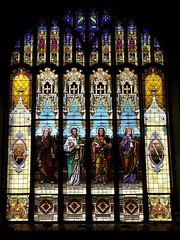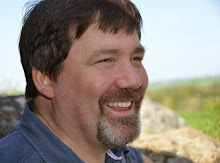| New Testament Window (Photo credit: Henry McLin) |
Reading some of the comments and articles by those in the so-called free churches, new church networks and non-denominational churches, I must confess to feeling somewhat uneasy at the tone some have taken on last week's vote in the Church of England Synod over women bishops.
Phil Moore, leader at Queen's Road Church Wimbledon, is fairly typical of this strand of comment when he writes that
"the debate is revolving around entirely the wrong question.
The big question is not whether there should be women bishops. It is whether there should be bishops at all."
Good in parts, his article is something of a curate's egg (another ecclesiastical office which I'm fairly sure Phil would take exception to).
On the one hand, and against the idea that the monarch is the "head on earth" of the Church of England, how can anyone who takes the New Testament seriously fail to agree with his statement that
"the New Testament is very clear that Jesus is the Head of the Church and that anybody else who tries to usurp his title had better watch out"?
On the other hand, Phil insists that,
"The New Testament tells us that [Christ] has chosen for his Church to be led by teams of elders (not by bishops, regardless of whether they are male or female)."
Can anyone fail to miss the irony of inserting a word which is not found in the New Testament ("team") at the expense of one which is ("episkopos", translated as overseer or bishop)?
I appreciate that many of my free-church brethren will respond that the term episkopos denotes something very different in the pastoral epistles from its later and more developed meaning of a senior leader of clergy and churches in a defined geographical area. I would agree with them. Ignatius may have been motivated by noble ideals, but his episcopalian solution was probably misguided, in my opinion.
This, however, is an issue of definitions rather than terminology in an absolute sense. It is quite legitimate to argue (from 1 Timothy for instance) that the churches should indeed be lead by bishops, as long as we define the role in terms of "eldering" and overseeing and strip it of its clergy-laity connotations.
The tone of some of the comments from my part of the church is also hard to hear when my type of church is quite happy to use terms never found in Scripture to describe some of its leaders: "lead elder" and "senior pastor" are two that come immediately to mind. Our hesitation to use the biblical word "deacon" might also be worth pondering.
An additional concern I have is with the implication that the Synod debate is "not an issue for us" since we are not Anglicans. Krish Kandiah of the Evangelical Alliance correctly (in my view) addresses the fact that this concerns the whole church, since the name of Christ is publicly invoked in the discussion and its outcomes. Matthew Hosier, although no fan of the episcopalian system, gives a somewhat broader, missional view of the matter from a non-conformist perspective.
I am sure that I am not alone as a member of one of the newer strands of the church in affirming the unity, catholicity and universality of the church. It's just that this message has not been sounded very clearly by some in my neck of the woods in the last week or so.






No comments:
Post a Comment